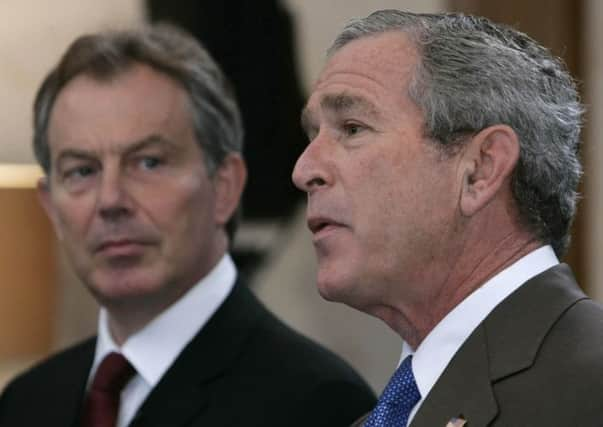Blair and Bush deal clears way for Iraq war probe


Sensitive extracts of exchanges between the former prime minister and former US president in the run-up to the war to topple Saddam Hussein will be made public – but the full versions will remain secret.
Years of negotiations over the release of the “vital” material, which includes 25 notes from Mr Blair to Mr Bush and more than 130 records of conversations between the former prime minister and then US president, are understood to have been behind the delay in publication of a long-awaited report into the 2003 invasion by the Chilcot Inquiry.
Advertisement
Hide AdAdvertisement
Hide AdUnder the agreement that has now been thrashed out, the information being disclosed will be limited to “quotes or gists” and the inquiry’s use of the material “should not reflect president Bush’s views”.
The deal was struck by the government’s top civil servant Sir Jeremy Heywood, who was principal private secretary to Mr Blair in 10 Downing Street in the run-up to the war, and inquiry chairman Sir John Chilcot. The agreement opens the way for the publication of the Chilcot Inquiry report, 40 months after the hearing ended.
Mr Blair insisted earlier this week that he was not the reason for the delay in the publication of the report.
In a letter, Sir John told Sir Jeremy, the Cabinet Secretary: “I appreciate that the inquiry’s requests for disclosure raised difficult issues of long-standing principle, which have taken some months to resolve: recognition of the wholly exceptional nature of this inquiry has allowed that to happen.
“My colleagues and I judge that this material is vital to the public understanding of the inquiry’s conclusions.”
He added: “Following our recent agreement on the principles for disclosure of material describing communication between the prime minister and the president of the United States, detailed consideration of the gists and quotes requested by the inquiry has now begun.
“Consideration will be based on the principle that our use of this material should not reflect president Bush’s views.
“We have also agreed that the use of direct quotation from the documents should be the minimum necessary to enable the inquiry to articulate its conclusions.”
Advertisement
Hide AdAdvertisement
Hide AdSir John said “potential gaps” in material had been identified which had been addressed, “including some material received by the inquiry very recently”.
Earlier this week, Mr Blair insisted he was not the reason for the delay as demands for its swift release increased.
He said: “It certainly isn’t me who is holding it up. The sooner it is published the better from my perspective as it allows me to go and make the arguments.”
Letters must be sent out to individuals facing criticism in the report before it is published to give them an opportunity to respond. Once that is complete, the report can be finalised and sent to Prime Minister David Cameron, who has previously said he hopes it will be published by the end of the year.
A Cabinet Office spokesman said: “The government is pleased that agreement on a way forward on both cabinet papers and UK/US exchanges has now been reached with the inquiry.
“This allows for the declassification and publication of the material the inquiry believes it needs to explain its conclusions.
“Resolving this issue has taken longer than originally hoped, but these are sensitive issues.
“The UK/US head of government channel [of communication] is very important and must be handled sensitively.
Advertisement
Hide AdAdvertisement
Hide Ad“The government and the inquiry are working to ensure the inquiry’s report is published as soon as possible and the government is doing everything it can to facilitate that.”
But Scottish anti-war campaigner Rose Gentle, whose 19-year-old son Gordon was killed in Iraq, condemned the deal for only allowing partial publication and warned that families would lose confidence in the Chilcot Inquiry.
Mrs Gentle, from Pollok, Glasgow, said she was “quite disappointed” that the full transcripts of what Mr Blair said to Mr Bush would not be published.
The co-founder of Military Families Against the War said: “We thought a lot of the documents might verify the truth about whether he did make a lot of mistakes, or he knew what he was actually taking us into. The families are a bit disappointed, really, as we don’t think we are going to get the truth now.”
Asked whether she had confidence in the Chilcot process, she said: “I did, because they were going into a lot of documents, a lot of questions. Now a lot of families think, what was the point, what is going to be the outcome, is it just going to be covered up now?”
The decision to publish correspondence between Mr Blair and Mr Bush was hailed by the SNP last night.
Angus Robertson MP, SNP Westminster leader, said: “I welcome this development but it is essential that the findings into the Iraq war are published as soon as possible, and certainly before the referendum. The findings of this inquiry have been delayed and blocked disgracefully for years.
“At least today’s news shows there is at last some movement. The people of Scotland deserve to have a clear view and understanding of how Westminster operated in the lead-up to this terrible war before they cast their vote in September.”